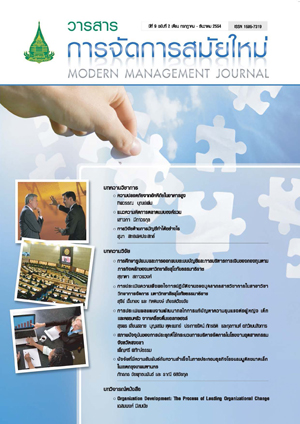ปัจจัยที่มีความสัมพันธ์กับความสำเร็จในการประกอบธุรกิจโรงแรมบูติคขนาดเล็ก ในเขตกรุงเทพมหานคร
Keywords:
ปัจจัยความสำเร็จ, โรงแรมบูติค, กรุงเทพมหานคร, success factors, boutique hotels, BangkokAbstract
บทคัดย่อ
การวิจัยนี้มีวัตถุประสงค์เพื่อ 1) ศึกษาลักษณะของการดำเนินธุรกิจโรงแรมบูติคขนาดเล็กในเขตกรุงเทพมหานคร2) ศึกษาระดับความสำคัญของปัจจัยทางการบริหาร ตามกรอบแนวคิด 7S ของแมคคินซีย์ต่อธุรกิจโรงแรมบูติคขนาดเล็ก 3)ศึกษาถึงความสำเร็จของผู้ประกอบธุรกิจโรงแรมบูติคขนาดเล็ก 4) ศึกษาถึงความสัมพันธ์ของปัจจัยทางการบริหารกับความสำเร็จของผู้ประกอบธุรกิจโรงแรมบูติคขนาดเล็ก โดยศึกษาจากประชากรทั้งหมดของโรงแรมบูติคขนาดเล็ก (4-79ห้อง) จำนวน 83 แห่ง เก็บรวบรวมข้อมูลโดยใช้แบบสอบถาม และการสัมภาษณ์ผู้บริหารของโรงแรมบูติคจำนวน 5 ท่านสถิติที่ใช้ในการวิเคราะห์ข้อมูล ได้แก่ ค่าร้อยละ ค่าเฉลี่ย ค่าเบี่ยงเบนมาตรฐาน และค่าสหสัมพันธ์
ผลการวิจัย พบว่า 1) โรงแรมบูติคขนาดเล็กในเขตกรุงเทพมหานคร ประกอบด้วยโรงแรมที่มีจำนวนห้องพักตั้งแต่7-79 ห้อง มีการบริหารโดยเครือข่ายโรงแรมจำนวน 17 แห่ง คิดเป็นร้อยละ 20.5 มีจุดขายที่สำคัญคือ การบริการที่เป็นเลิศร้อยละ 59.04 มีอัตราการเข้าพักเฉลี่ยเท่ากับร้อยละ 69.78 2) ระดับความสำคัญของปัจจัยทางการบริหารของธุรกิจโรงแรมบูติค พบว่าด้านระบบมีความสำคัญมากที่สุด รองลงมาคือ ด้านแบบการบริหาร ด้านทักษะ ด้านโครงสร้าง ด้านกลยุทธ์ ด้านบุคลากร ด้านค่านิยมร่วม ตามลำดับ 3) ความสำเร็จของผู้ประกอบธุรกิจพบว่า มีระดับความสำเร็จในระดับมากโดยมีความสำเร็จด้านกระบวนการภายในมากที่สุด รองลงมาคือ ด้านการเรียนรู้และพัฒนา ด้านลูกค้า และมีความสำเร็จในระดับปานกลางในด้านการเงิน (4) ความสัมพันธ์ของปัจจัยทางการบริหารกับความสำเร็จของผู้ประกอบธุรกิจโรงแรมบูติค มีความสัมพันธ์กันในทางบวกทุกด้าน ผลการวิจัยเสนอว่า โรงแรมบูติคขนาดเล็ก ควรให้ความสำคัญในการวางแผนระบบการบริหารงานที่ชัดเจน เพื่อให้เกิดผลสำเร็จทางด้านการเงิน
คำสำคัญ : ปัจจัยความสำเร็จ โรงแรมบูติค กรุงเทพมหานคร
ABSTRACT
The objectives of this study were: 1) to study business operations of small boutique hotels in Bangkok Metropolitan; 2) to study the important level of management factors based on McKinsey 7S Model for small boutique hotels in Bangkok; 3) to study the successful level of small boutique hotels in Bangkok; and 4) to examine the relationship between management factors and the success of small boutique hotels in Bangkok. The population of the study was 83 small boutique hotels (4-79 rooms) in Bangkok Metropolitan. Questionnaires were used to collect data and the manager interviews of 5 small boutique hotels were conducted. Statistical tools employed for statistical analysis were percentage, mean, standard deviation and correlation analysis.
The results showed that 1) the respondents were boutique hotels in Bangkok consisting of 7 to 79rooms. Seventeen hotels (20.5 %) were managed by hotel chain. The major selling point of respondents was the good service (59.04 %) and the average occupancy rate was 69.78%. 2) The most important management factor for small boutique hotels was System and the remaining factors were Style, Skill, Structure, Strategy, Staff and Share valued respectively; 3) The management success of small boutique hotels was at the high level and the highest successful level was in internal process and the high level was in learning and development, and customer success respectively. The financial success was in the middle level; and 4) the relationship between management factors and the success of small boutique hotels in Bangkok were positive in every dimension. The research results suggested that small boutique hotels in Bangkok should emphasize upon systematic planning which will result in finance achievement of the hotels.
Keywords: success factors, boutique hotels, Bangkok.



